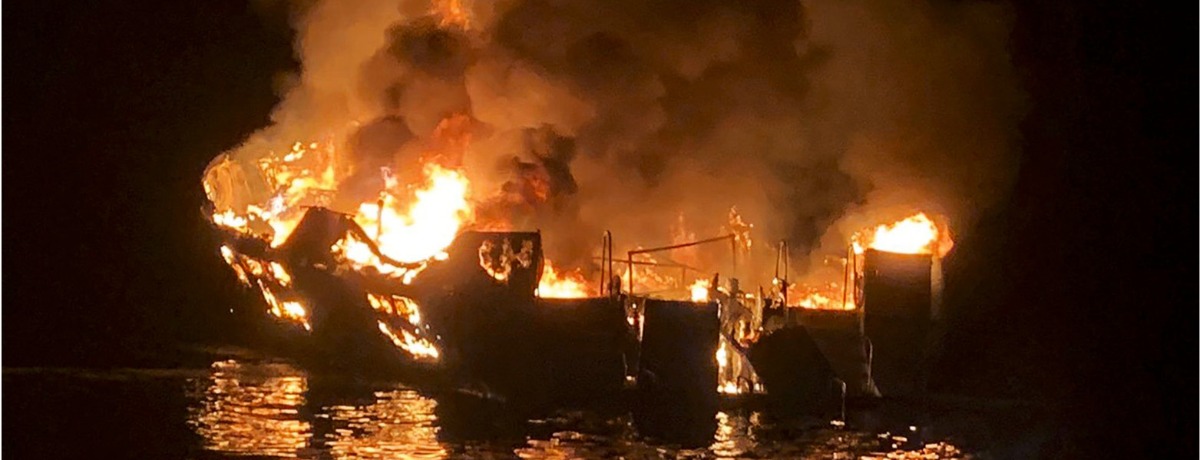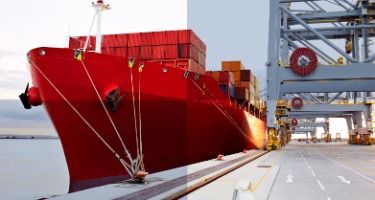On the early morning of September 2, 2019, the dive boat Conception caught fire off California’s Santa Cruz Island killing thirty-three passengers and one crew member. Five additional crewmembers escaped with various injuries. Four days later, the owner of the Conception filed suit in Los Angeles federal district court seeking to limit its liability to the value of the boat AFTER it burned and sank which it claimed was nothing. Why would the boat owner file suit so quickly? How could it limit its liability for such a tragic loss of life to nothing? The boat owner did so because of the Limitation of Liability Act of 1851 and the application of maritime law as detailed below. [1]
MARITIME LAW CONTROLS LIABILITY IN THE CONCEPTION CASE
The Conception fire happened in California waters just off the coast of Santa Cruz Island. Coastal states like California own the waters up to three nautical miles from their shores which are called their “territorial waters.” Nevertheless, federal maritime law controls the issue of liability in the Conception case because the fire:
- happened on navigable waters
- involved traditional maritime activity and
- had the potential to impact or disrupt maritime commerce.
Some notable case law:
- Foremost Ins. v. Richardson and Sisson v. Ruby. Curiously, had any of the passengers died while in the water SCUBA diving, maritime law would not apply unless the death was directly related to the operation of the Conception.
- Delgado v. Reef Resort Ltd. (SCUBA drowning did not fall within the court’s maritime jurisdiction because recreational diving did not involve “traditional maritime activity”);
- Delta Country Ventures, Inc. v. Magana, (the limitation action was dismissed due to lack of maritime jurisdiction when the boy dove off the house boat and hit an object on the bottom of the waterway because diving off a recreational boat was not deemed a “traditional maritime activity”).
When maritime law applies, it preempts the application of state law if the two conflict. In the Conception case, maritime law will control the issue of liability to the exclusion of California liability law. However, California law on damages will be allowed to supplement the remedies available to the passengers and their surviving relatives (but not the crew members) because the Conception was within the territorial waters of California. Yamaha Motors v. Calhoun, (recreational jet skier killed in territorial waters allowed to supplement maritime damages claims with state law damages).
DUTY OF CARE OWED BY BOAT OWNER TO PASSENGERS AND CREW
Under maritime law, a boat owner owes different duties to different classes of people. It owes one standard of care to passengers, a different standard to its crew members and in the case of cargo vessels, a third standard to longshoremen loading and unloading the vessel.
Passengers
Under maritime law, a boat owner owes a duty to exercise “reasonable care under the circumstances” for the safety of its passengers. Kermarec v. Compagnie General Transatlantique. Unlike train, airline and bus operators, boat owners are not considered “common carriers” who owe a “high” duty of care to their passengers. Similarly, boat owners are not strictly liable to passengers for defects in the boat or its equipment. Actual negligence must be proven, and that negligence must be a proximate cause or substantial factor in causing the injury or damages.
Crew Members
The crew members aboard the Conception are Jones Act seamen. As a result, they have a combination of statutory and common law remedies available to them.
The crew members have a right to receive “maintenance and cure” from their employer. This is similar to workers compensation and only requires that the crew member be injured or become ill during his/her service aboard the boat. “Cure” is the cost of medical treatment and “maintenance” is the purported value of the free room and board the crew member received while working aboard the boat. If a boat owner fails to pay maintenance and cure without strong justification, it can be sued for punitive damages. Atlantic Sounding v. Townsend. A crew member’s own negligence is not a defense to a claim for maintenance and cure.
In addition to maintenance and cure, a crew member can sue his/her employer for “Jones Act negligence.” As with the passengers, the boat owner owes a duty of reasonable care to make the vessel safe for its crew. However, that negligence does not have to be a proximate cause or substantial factor in causing the injury or damage. Instead, maritime law applies a “featherweight” causation standard for crew members: was the employer’s negligence “a cause no matter how slight” in bringing about the injury? CSX Transp., Inc. v. McBride. The comparative fault of the crew member is a defense and will reduce any award of damages proportionately.
Finally, a crew member can sue the boat owner for “unseaworthiness” which is a common law, strict liability claim similar to strict products liability. Under maritime law, the boat owner has to duty to provide a vessel, equipment, and crew that are “reasonably fit for their intended purposes.” If they are not, then the boat owner is strictly liable even if it was not negligent. When a piece of equipment breaks or fails, it was not reasonably fit even if it was brand new, and the boat owner is strictly liable. Although we do not know what caused the fire aboard the Conception, some piece of gear or equipment failed making the boat owner liable to its crew for unseaworthiness. Even if the fire was started by one of the passenger’s lithium-ion batteries, it is almost certain that some of the boat’s own gear will be implicated to prove unseaworthiness such as the power strip being used or the failure of the smoke alarms to sound earlier. Unlike Jones Act negligence, unseaworthiness must be a proximate cause or substantial factor in causing the injury. The comparative fault of the crew member is also a defense and will reduce any award of damages proportionately.
DAMAGES RECOVERABLE BY PASSENGERS AND CREW
Passengers and Their Surviving Relatives
If the fire had occurred more than three nautical miles from shore, the passengers’ claims would have been governed by the Death On The High Seas Act (“DOHSA”), and they would have been limited to seeking their economic losses (e.g. loss of financial support). They could not seek anything for their emotional distress or the pre-death pain and suffering of the passengers. However, because the fire happened within California territorial waters, the surviving relatives are entitled to use California law to supplement their damages. Yamaha Motors v. Calhoun. Under California state law, the estate of a deceased passenger can seek damages incurred between the time of the accident and death (e.g. medical expenses, lost wages) including punitive damages (see below) but cannot recover pre-death pain and suffering. California Code of Civil Procedure (CCP) §377.34. The surviving relatives can seek their own loss of financial support and services from the decedent and the loss of love, companionship and society. CCP §377.60 et seq.
Crewmembers and Their Surviving Relatives
The deceased crew members’ damages are limited by maritime law even though the fire happened within three nautical miles of shore. Under maritime law, the estate can seek damages suffered by the decedent between the accident and death, including conscious pain and suffering as long as it lasted for an “appreciable period of time.” There is no hard and fast length of time required, but seconds or even a few minutes may not qualify. Ghotra v. Bandila Shipping, Inc.,(10 seconds not enough); St. Louis, Iron Mountain & S. Ry. Co. v. Craft, (30 minutes considered borderline); Cook v. Ross Island Sand & Gravel Co.(2/1/2 minutes while drowning deemed sufficient). In a Jones Act wrongful death action, the surviving relatives can only seek economic damages (e.g. loss of financial support). They cannot seek non-economic damages for their loss of love, companionship, and society or punitive damages.
The surviving crew members can seek maintenance and cure, and both economic and non-economic damages including damages for their injuries, emotional distress and pain and suffering if they prove either Jones Act negligence or unseaworthiness. Even if they did not suffer physical injuries, they can seek to recover for their emotional distress as long as they were within the “zone of danger” which they were. Consolidated Rail Corp. v. Gottshall.
Punitive Damages
The issue of punitive damages in maritime law has been a major topic in the last few years. In Atlantic Sounding v. Townsend, the Supreme Court held that punitive damages were available for failure to pay maintenance and cure to a Jones Act seaman. This led many attorneys to believe that punitive damages were, therefore, generally available under maritime law. However, this year in Dutra Group v. Batterton, the Supreme Court held that punitive damages are not available under general maritime law except in the case of maintenance and cure. As a result, the deceased crew member’s relatives do not have a punitive damage claim and the injured seamen will only have such a claim if their employer fails to pay maintenance and cure. It is unclear whether the relatives of the deceased passengers will be allowed to pursue punitive damages under California law or if that is preempted by maritime law in light of the recent Dutra Group decision.
THE LIMITATION OF LIABILITY ACT
The United States enacted the Limitation of Liability Act in 1851. See also the Federal Rules of Civil Procedure, Supplemental Admiralty Rule F. It mirrored similar laws from England dating back to the early 1700’s. The purpose of these laws was to encourage investment in ships and shipbuilding by people who would not actually be sailing on the ships. As long as the shipowner/investor made sure the ship was seaworthy before it sailed from port, the owner/investor’s liability would be limited should something go wrong at sea that was beyond the owner/investor’s control.
Under U.S. law, the owner of a boat [2] can file suit for limitation of liability in the appropriate federal district court and deposit into the court the amount it claims the boat and pending freight were worth following the accident. The owner must file for limitation within 6 months of receiving the first written notice of claim. Like a bankruptcy filing, a limitation action essentially stays any cases that have already been filed and forces all potential claimants to file their claims in the limitation court. Because the limitation proceeding falls under the court’s admiralty jurisdiction, there is no right to a jury trial.
In the case of the Conception, the boat owner, Truth Aquatics, filed for limitation of liability on September 6, 2019, four days after the fire and presumably before any claimants had filed suit in state court. Doing so essentially preempted claimants from filing their own separate suits in state court and asking for a jury trial. In addition, it forced all of the claimants to file their claims in the limitation action.
In its limitation filing, the owner of the Conception claimed that the boat had no value after the fire. As a result, it was not required to deposit any money or security with the court to create a limitation “fund.” However, the boat owner may be required to post $420 per ton as its minimum liability under 46 USC §30506(b). Reports indicate that the Conception was 97 gross tons which would limit its maximum liability to $40,740.00 total if it is successful in limiting its liability. The claimants could ask the court to order the boat owner to deposit this amount with the court.
In the limitation proceeding, the claimants have the initial burden of proving that the boat owner was negligent or, in the case of Jones Act seamen, that the vessel was unseaworthy. If they meet this burden of proof, the burden then shifts to the boat owner to prove that it lacked “privity and knowledge.” In other words, the owner must prove that it was unaware of any negligence or unseaworthiness and that no one in privity with the owner such as the boat’s master (captain) was aware of same at the time the vessel left port.
For example, the NTSB reported that all of the crew were asleep at the time of the fire in violation of Coast Guard regulations. If the owner had a strict policy requiring a night watchstander and the master enforced it but on this night, unbeknownst to the owner or master, the watchstander accidentally fell asleep, the owner/master would lack knowledge or privity and would be entitled to limitation. If, however, the boat owner did not have a policy requiring a crew member to stand watch at all times or the master did not enforce such a policy, this would prove knowledge or privity and would defeat limitation.
If the boat owner meets its burden of proving a lack of knowledge or privity, then it is entitled to limit its liability to the value of the vessel and pending freight immediately following the accident which, in the case of the Conception was at most the statutory maximum based on tonnage discussed above.
It is impossible to predict the outcome of the limitation proceeding now because the exact cause of the fire aboard the Conception is not yet known. However, the cause of the fire is not necessarily determinative, because claimant’s counsel will undoubtedly focus on other issues such as the crew’s training and experience, the safety policies and procedures in place, the safety briefing given to the passengers, the smoke detectors and fire extinguishers, etc. Specifically, competent plaintiff’s counsel will focus on things that the boat owner or master were responsible for and were aware of or should have been aware of in order to defeat limitation.
CONCLUSION
The Conception tragedy will inevitably lead to changes in Coast Guard safety regulations for similar, overnight dive and fishing boats. It will also re-ignite the debate over whether the Limitation of Liability Act of 1851 is unfair, outdated and needs to be repealed or changed. That will depend in large part on the eventual outcome of the limitation proceedings and whether the media continues to cover the case.
[1] Note: This article discusses legal liability and defenses of the boat owner under maritime law in light of the boat owner filing for limitation of liability. It does not discuss the potential liability against 3rd parties including the designer and manufacturer of the Conception or suppliers of gear and equipment to the boat.
[2] Note: not all boats qualify for limitation. 46 USC §30506 excludes “pleasure yachts, tugs, towboats, towing vessels, tank vessels, fishing vessels, fish tender vessels, canal boats, scows, car floats, barges, lighters or nondescript vessels.”
Albert Peacock is a practicing attorney of Product Liability Litigation and Admiralty & Maritime Law with Peacock Piper Tong & Voss. Peacock was Orange County's 2017 "Lawyer of the Year" in Admiralty & Maritime Law.




















